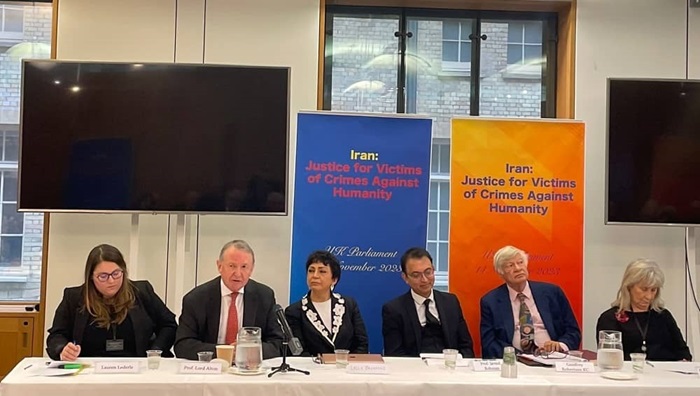
In a significant parliamentary session held in London on November 14, global attention was drawn to the lingering shadow of the 1988 massacre of political prisoners in Iran.
The session, which saw participation from senior members of both the House of Commons and the House of Lords, was a platform for profound discussions and revelations about a dark chapter in Iran’s history and its ongoing implications.
At the forefront of the session was Professor Javaid Rehman, the UN Special Rapporteur on the Human Rights Situation in Iran. Professor Rehman’s scathing remarks highlighted the “almost complete absence of accountability and the prevailing culture of impunity in the Iranian constitutional, legislative and administrative framework.” His criticism extended not only to Iran but also to the international community for its failure in bringing the perpetrators of the mass executions to justice.
According to Prof. Rehman, the impact of this tragedy has been far-reaching, with perpetrators occupying influential roles in the current Iranian regime. This, he noted, is a contributing factor to the ongoing mass killings of protesters in recent uprisings. “The absence of accountability derives from various deficiencies within state structures,” he emphasized, underscoring the systemic issues plaguing Iran’s political and legal systems.
Session at UK Parliament Condemns #Iran’s 1988 Massacre, Calls for #Justicehttps://t.co/P4mk19JA8E
— NCRI-FAC (@iran_policy) November 23, 2023
Prof. Rehman’s statement delved into the depth of human rights violations in Iran since the 1979 Iranian Revolution, pointing out how the consolidation of power under the Vilayet-e-Faqih system has negated constitutional principles like the separation of powers and the rule of law. He specifically addressed the mass executions of 1981, the repression of religious minorities, and the enforced hijab policy, describing them as part of Iran’s “painful legacy.”
The session also shed light on more recent events, including the death of 22-year-old Jina Mahsa Amini in police custody and the subsequent nationwide protests under the banner of “women, life, and freedom.” Prof. Rehman condemned the violent crackdown on protesters, noting the “widespread pattern of unlawful, lethal use of force,” particularly against religious and ethnic minorities.
In his statement, Prof. Rehman called for international attention and action, advocating for the establishment of an independent international fact-finding mission. He stressed the need for accountability for the enforced disappearances and executions of 1988 and the protests of November 2019, stating, “As an international community, we must demand an end to the culture of impunity for the Iranian regime, demanding justice and accountability for the victims.”
Those who turn a blind eye to so much abuse of #HumanRights in #Iran ,know that this policy will open the way for more atrocities and genocide in the region and the world. pic.twitter.com/Oyio5BYOap
— Maryam Rajavi (@Maryam_Rajavi) November 3, 2023
The London session, thus, not only revisited a tragic past but also highlighted a persistent problem in the present – the need for accountability and justice in Iran. Prof. Rehman’s words echoed a call for global responsibility, urging the international community to take a stand against human rights violations and the culture of impunity that continues to prevail in Iran.

MEK Iran (follow us on Twitter and Facebook), Maryam Rajavi’s on her site, Twitter & Facebook, NCRI (Twitter & Facebook), and People’s Mojahedin Organization of Iran – MEK IRAN – YouTu
